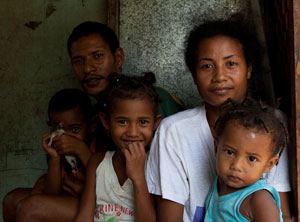Each year more than 280,000 women around the world die as a result of complications during pregnancy and childbirth. Recent research suggests that satisfying the global unmet need for contraception could reduce maternal deaths by an estimated 30 per cent.
Across South East Asia and the Pacific some 26 million women want to use modern methods of contraception but don't have access to them. The region is growing quickly and there are big challenges. A young and fast-growing population and high levels of urbanisation mean there is growing demand from young people for family planning services. And poor and vulnerable people are usually the ones that miss out.
To help meet these needs Australia will double its funding for family planning services to more than $50 million per year by 2016, up from $26 million in 2010.
AusAID Director General Peter Baxter made the commitment on Wednesday, 11 July at the London Summit on Family Planning hosted by the UK Government and the Bill and Melinda Gates Foundation.
Mr Baxter said that Australia's investments will continue to focus largely on the Asia Pacific and will help women in the region make decisions about how many children they have and when they have them.
The geographic remoteness of the Pacific means that governments can struggle to deliver family planning services. In PNG we are training midwives which play an important role in the provision family planning services. There are currently only about 150 in PNG, many of whom are close to retirement. By 2015 we plan to have trained an additional 500. We are being innovative too. We are building a national non-scalpel vasectomy training centre and clinic in the Eastern Highlands in 2012. Non-scalpel vasectomies can be performed by Community Health Workers and have been widely accepted by men in the highlands region - the most densely populated region of Papua New Guinea.
To be sustainable family planning needs to be part of a broader effort to improve reproductive health services. And these services in their turn must be a routine part of the health services provided in every community.
Australia's spending on family planning has increased considerably in recent years and these investments are delivering results. Australia is proud of our commitment to double spending on family planning. We are proud too of the broader work that we are doing to support stronger health systems, not least the $1.6 billion that Australia has committed to spend on women's and children's health by 2015.
Apart from the life-saving implications of having fewer children, the economic benefits of a smaller family are also significant. Fewer mouths to feed mean incomes go further. Women are available to join the workforce and more children, including girls, can go to school.
The Gates Foundation described the Summit as an 'effort to make affordable, lifesaving contraceptive, information, services and supplies available to an additional 120 million girls and women in the world's poorest countries by 2020'.
Around 250 delegates from around the globe attended including Jakaya Kikwete, the president of Tanzania, Chantal Compaoré, first lady of Burkina Faso, and the Bangladeshi minister of health, AFM Ruhal Haqu.
'The Lancet' commentary: Giving the world's poorest women the power to plan their families
In July, Australia's Minister for Foreign Affairs Bob Carr, together with Rajiv Shah, USAID Administrator; Melinda Gates, co-chair of the Bill & Melinda Gates Foundation; and Andrew Mitchell, U.K. Secretary of State for International Development, co-authored a commentary piece for The Lancet's special series on family planning.
The article highlights the importance of family planning as a means to promoting healthy families, increasing opportunities for economic development, and enabling strong and vibrant nations.
Read the commentary [PDF 609kb] or see it on 'The Lancet' website.

